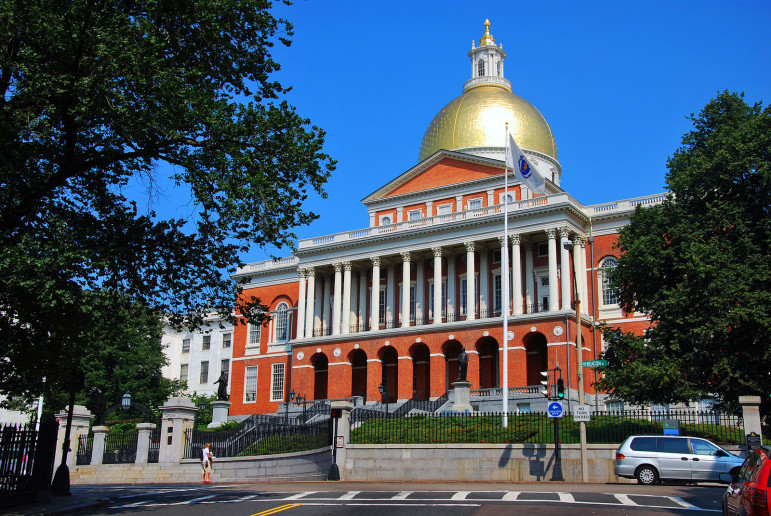
Wikimedia Commons / Chensiyuan Massachusetts State House.
A request that would provide relief to residential property owners in Watertown moved a step toward approval when the House of Representatives approved the Home Rule Petition recently.
In August 2022, City Councilors John Airasian and Emily Izzo brought forward the request, which was approved by the Council, to request that Watertown be able to shift the tax burden from residential properties to commercial, industrial and personal properties.
Airasian was pleased to see the petition make progress: “This should have a sizeable impact on the residential real estate taxes.”
Izzo added in her email to constituents:
“The Home Rule Petition brought to the City Council by Councilor Airasian and myself has passed the House and is now pending approval by the Senate. This would allow us to shift the tax burden away from the residential class to the commercial class Thank you to our State Representatives, John Lawn and Steve Owens for your work on this!”
Watertown has not been able to make the full shift due to changes in the real estate market that have resulted in commercial properties making up a larger portion of Watertown’s overall property value, said City Manager George Proakis.
“As our commercial/industrial buildings have become higher in value, we have come up against that cap, and therefore have to limit how much we can shift to the residential side,” Proakis said.
Charles River Chamber President Greg Reibman said that shifting the burden onto commercial properties could negatively impact businesses.
“We fully appreciate the impact high taxes have on everyone,” Reibman said. “But at a time when so many businesses are still struggling to rebound from the pandemic, inflation and the increased cost of labor, we urge our city leaders to be careful not to shift too much of tax burden onto the back of our restaurants, shops and other small businesses.”
For many years, the Council has given residential property owners some relief by using the maximum shift allowed by State Law of 175 percent of taxes from residential to commercial properties. In 2021, City Assessor Earl Smith told the Council that due to a detail of the State Law on shifting the tax burden, they could not make the full 175 percent shift for Fiscal Year 2022. The shift was equivalent to 159 percent.
State law says that the total portion of the residential tax cannot be below the higher of either 50 percent of the tax levy or the lowest percentage of the tax levy made up by residential property tax since the the City created tax classifications for different types of properties in 1980. The lowest portion was 57.39 percent.
The Home Rule Petition would allow the shift to be made on 50 percent of the tax levy in Fiscal Years 2024 and 2025. If approved, the change could mean four-figure savings for Watertown homeowners. In Fiscal Year 2022, Smith said, had the 175 percent shift been able to be made on 50 percent of the tax levy it would have cut about $15 million out of the residential property taxes, or an average of about $1,500 per property.
Proakis said that the City may look at a permanent fix to the problem.
“If passed, this will give us more flexibility in Fiscal Year 2024 and 2025 (this year and next year’s taxes),” he said. “But, we also plan to ask to make this change permanent.”
Owens said Home Rule Petition was “engrossed” by the House on Sept. 21, and added there are still a few more steps before it is approved.
“It heads to the Senate for a vote there. Once they engross it it heads back to the House to be ‘enacted,’ then back to the Senate for enactment,” Owens said. “From there it heads to the Governor’s Desk. She has 10 days to sign or veto the bill.”
See the details of the Home Rule Petition by clicking here.
Most of the 351 communities in Massachusetts do not have a split, or different rates, for residential and commercial properties. Of the 58 that have split tax rates, 43 cities in the Bay State make the shift from residential to commercial.
Hi, Charlie:
“Of the 58 that have split tax rates, 43 cities in the Bay State make the shift from residential to commercial.” It sounds like the other 15 cities split their tax rates between two other categories of taxpayers.
If that’s correct, do you happen to know what those alternate categories are?
Tx in advance.
The other 15 have a split tax rate between residential and commercial, but they do not shift the tax burden. I think they only have a residential exemption. You can see more details here https://www.mass.gov/doc/splitting-the-differences-reviewing-tax-rate-shifts/download
Thanks to Councilors Emily Izzo and John Airasian for taking the initiative to start the process of providing some tax relief to us. With costs going up on everything, it would certainly be helpful to see something go down.
Many people have been asking for a long time why all the new developments haven’t provided the tax reductions to us that were expected. Maybe this is a start to make life a little better for all of us during these high inflationary times.